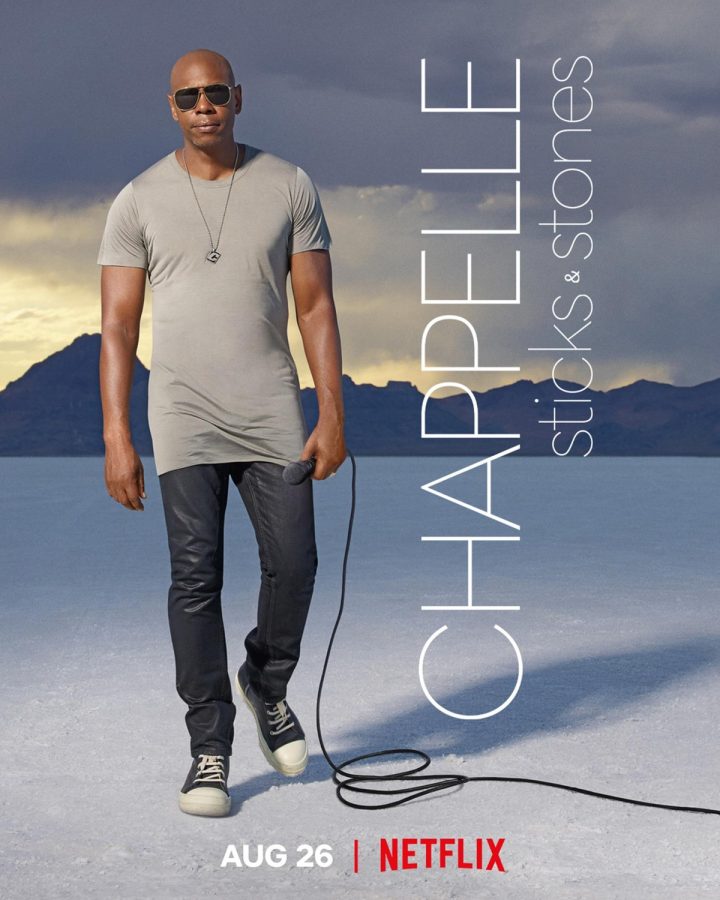Why Only 9 Reviews on Dave Chappelle Sticks and Stone Rotten Tomatoes
Review: What the critics got incorrect about "Dave Chapelle: Sticks and Stones"

Courtesy of Netflix.
The job of the critic and the stand-up comedian are incredibly similar in many means. Like the critic, the stand up-up comedian works from a position of authoritative ascertainment, a singular effigy speaking to an audience of many. And like the critic, the stand-upward comedian has historically risked very trivial while putting others, and often society as a whole, on boom. Merely things take dramatically changed for the stand up-up comedian. Dave Chappelle'due south latest Netflix special, "Sticks and Stones," shines a direct spotlight on that historical shift in "run a risk" for comedians. Chappelle has been working the stand-up comedy scene since the early 90s, and he'southward seen get-go-hand how things have changed for him and his peers. But that's not the indicate. The signal is that the special was funny, well-written and structured like it was written by the xxx+ year one-act veteran that he is. The skill and genius in Chappelle's comedic style are in his nonsensical storytelling power. Just when you lot think he has only been talking without any direction, BAM! He ties the story back to a major bespeak, 1 that he was building to the unabridged time. At that place is a method to his comic madness, and it was never easy to see, just nosotros got at that place. That was primarily how most of the special was structured, jokes that leave you almost more impressed than dying laughing. The special was itself comedic genius, and I don't recall anyone would deny that. Non even the critics who rated it then poorly. The controversy surrounding the rating of Chappelle'south special is that the audience score in no way reflected the critic score. While (every bit of Sept. 24) 37,583 Rotten Tomatoes users gave the audience score a 99%, the highest rating a television show or moving-picture show can have on the website, 17 critics gave the special a dismal 31%. These are some U.S. Senate-levels of uneven representation. And all of it has to do with perceived intent. Reading through many of the negative critic reviews, few of them mention the quality of the special's writing, delivery or overall funniness, only rather, assume malice intent in Chappelle's words and gauge him based on that assumption. An example is in Melanie McFarland's, rated every bit a "Tiptop Critic" by Rotten Tomatoes, review of the special. "I accept a different theory. On the whole, 'Sticks & Stones' exists as a defiant design to intentionally offend large swaths of the audience Chappelle deems too thin-skinned and easily outraged, likewise quick to find criminal offence, while serving up elementary, depression-bar yucks to anyone yearning for validation of their anti-P.C. opinion." McFarland said. Where McFarland fails here is in her endeavor to get into Chappelle's caput and guess his inferred intent. She does not even touch the quality of the special'due south direction or production or comedic brilliance in Chappelle's writing. And in doing and then, she has failed in her job equally a critic. As casual consumers of media and culture, we rely on these "Top Critics" to honestly and fairly gauge the quality of the content that we consume. We expect scores and ratings to give us an accurate await at the quality, not a critic'south personal disagreements with an artist'south assumed intent. At present, for argument'due south sake, let'southward say that these critics have a bespeak. Offensive jokes for the sake of being offensive are inherently depression quality and should accept abroad from Chappelle's special's overall score. Fifty-fifty then, I disagree that that'due south what's happening here. Nerdwriter writer Evan Puschak did an in-depth video essay on how comedians are the moral detectives of our club. Just equally we sympathize with and allow criminal detectives similar Sherlock Holmes or other detectives in television or film to curve the rules of morality for the greater good, we should give elite comedians the same reasonable elbowroom in social club to approach taboo topics or signal out hypocrisies in the zeitgeist. "If we desire our commonage morality to remain nuanced and progressive, we have to let comedians near the things we find uncomfortable or perchance, even wrong," said Puschak. In that way, Chappelle played the role of moral detective perfectly. A perfect case of this is when Chappelle describes his experiences seeing heroin-addicted white people all over Ohio for the first fourth dimension. The picture he paints with his words is clear and at-times really funny, but also talks about the gravity of the opioid epidemic, and how it's destroying lives and families. But then, Chappelle compares the opioid epidemic to the crack epidemic that disproportionately affected primarily African-Americans in the 80s. "And all this s— they talk near on the news about how divided the nation is, I don't believe it. I feel like, nowadays, we're getting a real good look at each other." said Chappelle. "I even have an insight into how the white community must've watching the black community get through the scourge of crack … considering I don't care either." Once more, I'm not going to endeavour to get into Chappelle's head and give you a definitive statement on whether he was joking or not (though to me, it's pretty clear that he is), because regardless of intent, Chappelle is pointing out a hypocrisy in how victims of the fissure epidemic were treated like criminals and degenerates and how victims of the opioid epidemic are being treated like sick people going through a wellness issue. Despite bossy backlash and the changing perceptions of the comedy sphere, Chappelle has created a well-written, well-delivered, funny comedy special where the humor seems to come secondary to profound moral detectivism. Rating: 8/x
Source: https://loyolamaroon.com/10023950/life-times/review-what-the-critics-got-wrong-about-dave-chapelle-sticks-and-stones/